#layla and majnun
Text

qays ibn al-mulawwah (tr. by me)
#qays ibn al-mulawwah#layla al-aamiriya#layla and majnun#**#poetry#arabic poetry#UPDATE#->#ill post the full translation another time
2K notes
·
View notes
Text
Are Majnun’s eyes within the clouds, that they
Shed Layli’s cheeks’ hue on each rose below?
—Couplet from a poem by the tenth-century poet Rabe’eh, the earliest-known woman poet to write in Persian
.
Commentary by translator Dick Davis:
“...we come to Layli and Majnun, star-crossed lovers from an originally seventh-century Arabic tale that quickly spread all over the Islamic world. Since he is a tragic figure, unable to be united with his beloved, Majnun is often represented as weeping and this is why he is mentioned in the third stanza of the poem as being “within the clouds”—he is weeping the dew onto the flowers below him (dew continues the implication that the poem is describing a scene in the early morning, which is considered to be the loveliest and most refreshing time of day). Layli’s cheeks are imagined as red, either as an indication of her beauty or of her flushed, bewildered distress, or both, so Majnun’s tears, which are the same color as her cheeks, are red. The conceit is that the tears are bloody, indicating that Majnun has wept so long and so hard that his eyes are injured and he weeps blood; with the same implication of relentless injurious weeping, tears are almost always referred to as red in pre-modern Persian verse (an exception is when they are compared to pearls). So the roses are red because Majnun has wept his red tears onto them.”
From The Mirror of My Heart: A Thousand Years of Persian Poetry by Women
25 notes
·
View notes
Text
“I sought not fire, yet my heart is all flame. Layla, this love is not of earth.”
- quote from Layla and Majnun in Chain of Gold
“All Hell’s power could not extinguish that love.”
- quote from Grace about James and Cordelia in Chain of Thorns
“Let him be the effigy atop the tomb of a knight, she thought; let him be that warrior. He had wrought his will, and it had been more powerful than a Prince of Hell’s.”
- quote from Cordelia about James in Chain of Thorns
#their love was not of earth#jordelia#james herondale#cordelia carstairs#cordelia herondale#the last hours#tlh#chain of gold#chain of iron#chain of thorns#chot#chot spoilers#layla and majnun#ya books#tsc#the shadowhunter chronicles
75 notes
·
View notes
Text
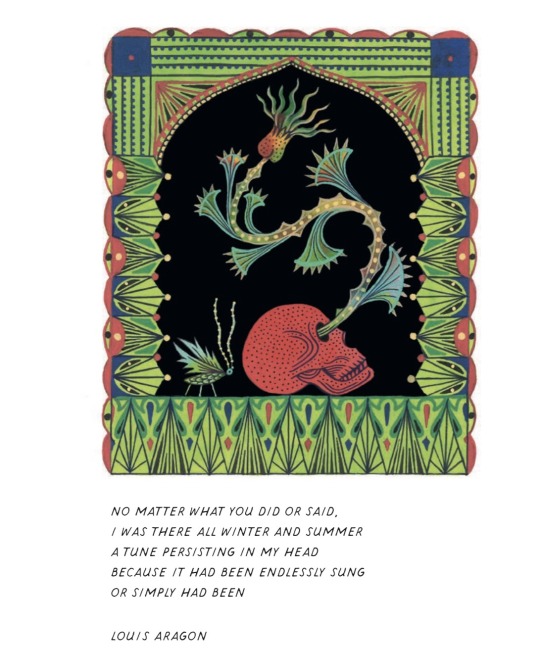
Louis Aragon
#alliwanttodoiscollectpoetry#poem#poetry#poems#poet#poets#anthology#tumblr poetry#poem of the day#poetry blog#Louis aragon#poemblr#poetblr#layla and majnun
11 notes
·
View notes
Quote
If only the wind could touch your lips and bring your kisses to me, but then I should be jealous of the wind and ashamed of myself for asking.
Nizami Ganjavi, in Layla and Majnun.
#poetry#classics#persian literature#layla and majnun#nizami ganjavi#romance#novels#books#love#quotes#words#thoughts#literature
54 notes
·
View notes
Text
Majnun
They tell me
"Crush the desire for Layla in your heart!"
But I implore thee, oh my God,
Let it grow even stronger.
Take what is left of my life and add it to Layla's.
Let me never demand from her as much as a single hair,
even if my pain reduces me to the width of one!
Let her punish and castigate me:
her wine alone shall fill my cup,
and my name shall never appear without her seal.
My life shall be sacrificed for her beauty,
my blood shall be spilled freely for her,
even though I bum for her painfully, like a candle,
none of my days shall ever be free of this pain.
Let me love, oh my God,
Love for love's sake,
and make my love a hundred times as great as it was and is!
-- Nizami Ganjavi --
An excerpt from the epic poem written about the love story of Layla and Majnun [Majnun: crazy; he was literally crazy in love with Layla]
#poem#epic poem#love poem#crazy in love#romantic poem#arabian poem#middle eastern poem#poetry#majnun#Layla and Majnun
19 notes
·
View notes
Text
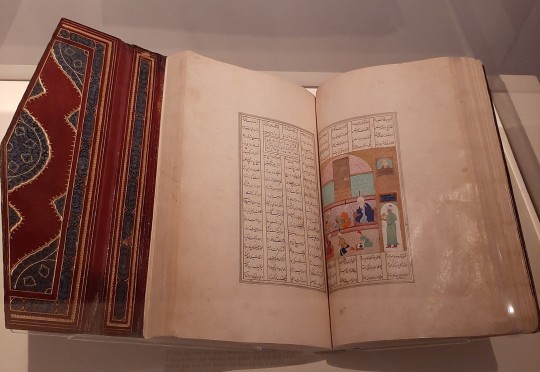
Layli and Majnun at School, from a manuscript of the Quintet (Khamseh) by Nizami
Iran, Shiraz, 1527
This intimate scene depicts the doomed lovers Layli and Majnun, as Qais - later called "the mad one" (Persian, majnun) due to his extravagant passion - meets Layli for the first time in their shared schoolroom. The highly detailed painting depicts activities typical of the sixteenth-century schoolyard, where the students practice their writing skills and study books; one poor scholar is being punished by a schoolmaster.
28 notes
·
View notes
Text
This episode left me with feelings. Like, FEELINGS.
Not just because Layla is one of my favourite songs. But, uh... The story behind the song... Specifically, concerning Layla and Majnun...
Forget it. Now, I have concerns.
#Nandermo#Heh... Heh...#WWDitS#WWDitS Spoilers#What We Do in the Shadows#What We Do in the Shadows Spoilers#Layla#Derek and the Dominos#Layla and Majnun
15 notes
·
View notes
Text
Is that not, after all, the way a man's mind works? When goals are not reached and prayers not answered, do we ever stop to think that God's apparent silence may be for our own good? We are convinced that we know our own needs, it is true. But needs are often confused with wants, and those things that are wanted but not needed are sometimes the cause of our downfall. Of course, if we could tell what the future holds for us, this confusion would never arise. But the future is veiled from our eyes; the threads of each man's fate extends well beyond the boundaries of the visible world. Where they lead we cannot see. Who can say that today's key will not be tomorrow's lock, or today's lock not tomorrow's key?
-Layla and Majnun by Nizami Ganjavi
9 notes
·
View notes
Text
book review: layla and majnun by nizami ganjavi | 1192

summary:
the origin of the sad tale of majnun and layla dates back to antiquity. the legend of their love, originally developed on arab ground, subsequently became widespread throughout the muslim east among many peoples. over time, this story acquired rights in iran, central asia, and azerbaijan. the images of majnun and layla unceasingly haunted the imagination of many poets, but it was nizami ganjavi whose immortal work has contributed to an even greater spread of the tragic love story of layla and majnun.
my opinion:
i want to start by saying that the book itself may not be as bad as i would have thought it was, but the problem lies in the translation. i will sincerely say that colin turner's translation is terrible, i thought my reading would end when i saw the word "ok" in the translation. really? "ok" in an adaptation of a 12th century work?
so most likely my score is so low due to the failure of the translator, alas i couldn't find james atkinson's translation.
but if we go straight to the book, i would say it's not bad, judging by the work of the author and not the translator.
the first thing i thought of was romeo and juliet from the 12th century, and then it wasn't that bad. but then it went on to become a total exaggeration. qays became so obsessed with love that he became, roughly speaking, insane. probably today he could even be called a stalker.
i mean he was offered help, he accepted it, he was given food and water and all cleaned up, and then he brought up his doomed love again and turned away from everyone. it even seemed a little mercenary to me.
it also shown that layla suffers too, and just to compare what the position of girls in the east was in those days: she was forbidden to see her lover, and her tears were considered a disease, she was forcibly married off and her husband harassed her.
their love was doomed just because of the it - the love was so strong that it drove the man mad.
speaking of the good side, i think of the following:
• we were shown the torment of the lovers, that is, it was not dry material, but filled with action;
• no matter how it sounds, we were shown the power of love, what it can lead to and what it motivates people to do;
• it was interesting to see the euphemism of belief underneath of love, cause love is as strong as belief.
• how trust and resilience are played out. layla's father, even after the defeat of his troops, still refused to give up his daughter because he understood that he would burden her with an unhappy life.
• as well as majnun's trust in his friend, and his loyalty, eagerness to help the young man reunite with his beloved.
and to summarize, i can say that the book is not that bad, but it will probably be difficult to understand for modern people, just as it was difficult for me. there is a thin line between belief, love and madness, which the characters could have crossed any minute. but i was probably satisfied with the ending, even as death separated them, perhaps it will give them some privacy.
my rating:
2.8/5

two lovers lie sleeping in this tomb,
united at last in death’s dark womb.
faithful in separation, true in love:
one heart, one soul in heaven above.

#book review#nizami ganjavi#layla and majnun#literature#arab literature#persian literature#fiction#novel#books
4 notes
·
View notes
Text
Love came; its sword did not discriminate But cleared the house, and left it to its fate—It took their hearts, and gave them grief, and made Them anxious, and bewildered, and afraid.
- Layli and Majnun by Nizami Ganjavi, trans. Dick Davis
#layli and majnun#layla and majnun#majnun layla#مجنون ليلى#persian poetry#persian literature#literature#persian
18 notes
·
View notes
Text
I pass these walls, the walls of Layla
And I kiss this wall and that wall
It's not love of the houses that has taken my heart
But the one who dwells on those houses
-Majnun
youtube
#mysticlove#poetry#self discovery#spiritualhealing#inner journey#meditation#youtube#motivational quotes#new moon#spirtitual#mystical#layla and majnun#spiritualawareness#love
3 notes
·
View notes
Text

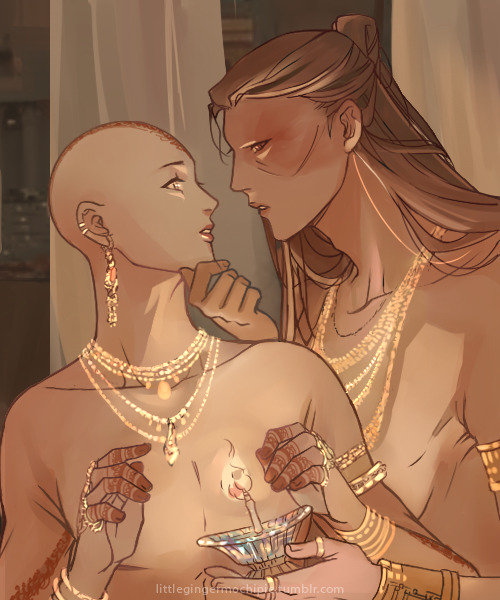

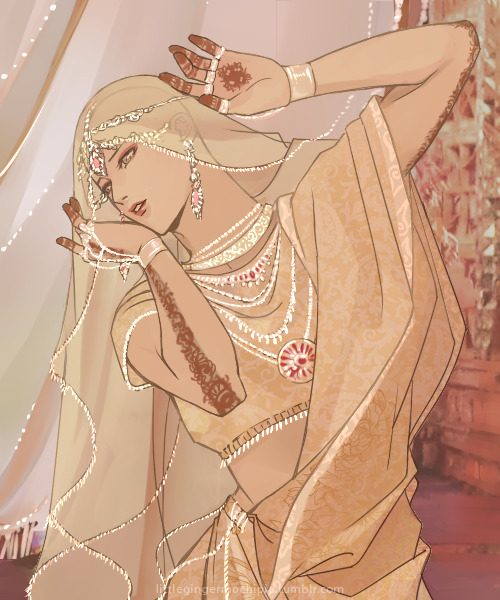

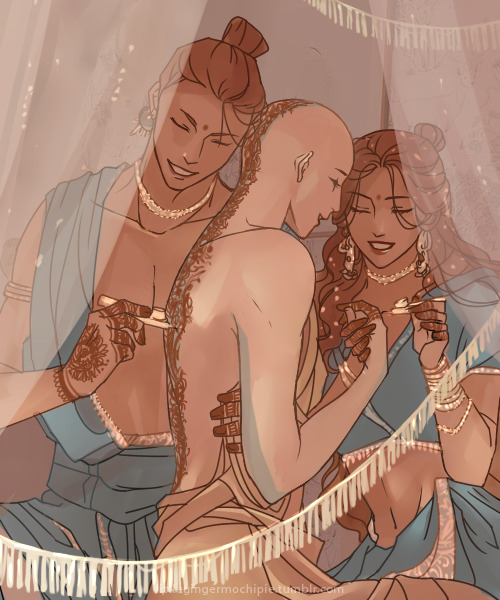

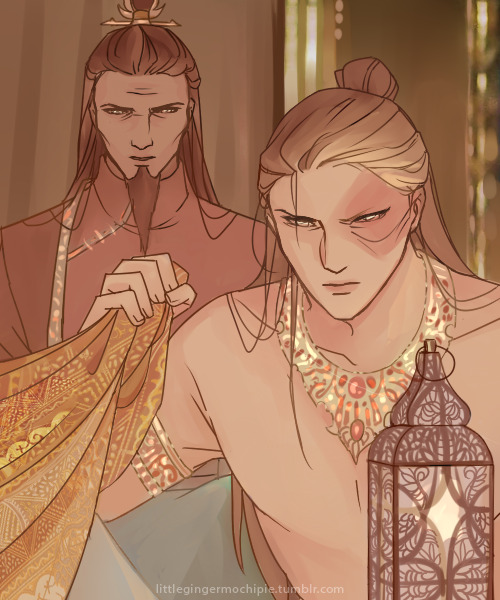
zukaang | rajamandala | राजमण्डल | 羅闍曼荼羅
devdas, chigo, lengger lanang and layla-majnun inspired tale
the day zukō was born, agni bestowed him with a single eternal flame, everlastingly alight inside the gentur lamp which he would carry along with him everywhere he went. no one could extinguish and light it back at will except the one who’s destined to guide his fate, as prophesied at naloni mitoni.
after his genpuku as the successor of ōzai tennō, zukō accompanied azhura in attending durga puja and seren taun, hosted by baginda bhumi at the central port of canggu. the siblings then reunited with maiko and tài linh, who became patrons of entertainment in northern manjung.
their seventh generation of tawaifs featured the esteemed amrapali, whose swara and abhinaya effortlessly enamored kaldera royals. as she danced, not only did she take everyone's breath away, but also the life of every kindled flame in the room. then, when she lit them back with gentle sway of her hands, zukō knew that she's the one.
realizing that his son had set his eyes on a mere yìjì, ōzai warned the prince that he might be deceived by outlanders witchery, but zukō insisted that he trusted agni's sacred will. he continued to chase the tawaif in unquenchable desire to know about her more, unaware that the fate he would thread on was to become a madman, lost in utterly blind love which turned into the purest form of devotion.
because amrapali was, in fact, not merely a dancer and disciple of buddha. she was bodhisattva kannon in her avatar form-a man named āng, awakened in rana pota lake as the only living sky dweller. his kin were mercilessly wiped from existence milennium ago by zukō's ancestor, souzan tenshi, who begun the conquest of rajamandala.
āng's crimson henna, drawn by performers of tide drifters; adinda katara and kakanda saka, covered his distinguished irezumi, while his voice was trained to move even the most hardened heart by paduka běifāng and a hia haru, the stone wielders. together with his beloved shrivijayans, the avatar would liberate the victims of war under ōzai's tyrant rule.
however, it was out of āng's prior knowledge that he would possess karmic ties with the very son of his own enemy through vortex of conflicted, mortal feelings. willingly bestow thousands of blessings to zukō's thousands of prayers, he would, but even as the emanation of god, āng still could not simply pull the strings of fate as he selfishly pleased.
by the will of sang hyang widhi, āng was destined to succeed in ending the misdeeds of fire breather’s forefathers, but at the cost of his heart falling forever in unfulfilled love. for he knew, that even though zuko took the role of mirabai to krishna, their wish to be united would be granted only in death like that of layla and majnun.
for @zukaangweek third day prompt: sacred/possesive
#zukaang#kataang#sokkaang#realistically sad ending#religiously good ending#(majnun) loving god through his creation (layla) and the notion of their virgin love is the most powerful agape of all#both agni and kannon testing the earthly beings (like shinta in agni pariksha and chigo with monks) is the red thread here for zukaang#the original trio of the gaang in troupe of court entertainers planning to overthrow villains is absolutely hot#you can take the aang/water siblings tag platonically or as or spicy as you want 👀👌#yep the namings - titles - endearments - lyrics/poems - places - terms here is mostly from south - southeast - east - western asia#obligatory zukaang bollywood au that went overboard because my brain wont shut up#this is also a tribute to the iconic lgbt dancers lengger lanang god i love their graceful presence so much#aang fanart#zuko fanart#katara fanart#sokka fanart
701 notes
·
View notes
Quote
You are the cause of my pain, yet the love I feel for you is my only consolation, my only cure.
Nizami Ganjavi, in Layla and Majnun.
#poetry#classics#persian literature#fiction#romance#books#novels#words#thoughts#quotes#historical#literature#love#layla and majnun
34 notes
·
View notes
Text
I no longer know who I am. I keep asking myself, “Who are you? What is your name? Are you in love, and if so, with whom? Are you loved, and if so, by whom?”
#wow the fact that i can fully relate with this small stanza is 💀💀💀#are you in love? no i find it hard to feel that way#are you loved? hopefully 😭😭#keshi reads: layla and majnun
15 notes
·
View notes
Text
In my heart dwell
a thousand Majnuns,
and a thousand Laylas.
— Siham Bouhlal, [Qui est Madjnoun]
14 notes
·
View notes